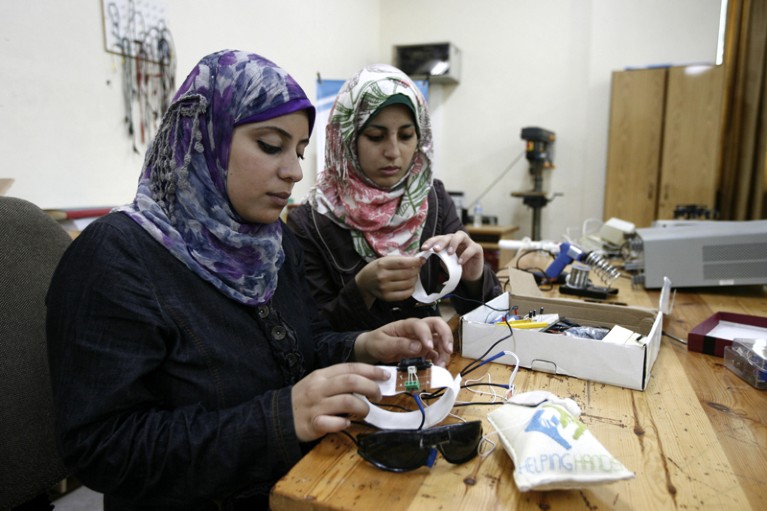
Scientists in the Palestinian territories need support from colleagues overseas.Credit: Emad Nassar/APA Images/ZUMAPRESS.com/Alamy
Scientist-statesman Chaim Weizmann was Israel’s first president. He was also a chemist, and had earlier helped to create the world-ranking research institute in Rehovot that now bears his name. He famously declared that a state should be built on science — then he tried to do just that. Today, Israel is a global player, investing more than 4% of its gross domestic product in research and development, one of the highest proportions in the world. Its scientists are winning some of the most prestigious international grants, and are collaborating with partners around the world.
Yet since 2002, scientists in Israel have faced calls for an academic boycott, a move that Nature opposed at the time and continues to disagree with (see Nature 417, 1; 2002). The controversy is a reminder that Israel’s stellar science is often overshadowed by the troubled politics of the region. Not least of these is Israel’s occupation of the Palestinian territories, which concerns researchers around the world and many Israeli scientists, too.
If Israeli science is overshadowed by politics, then Palestinian science has an even more diminished profile. A Nature reporting trip to the region showed how hard conditions are. Frustration and anger bubble below the surface — but the scientific spirit endures.
In the West Bank and East Jerusalem, the welcome seeds of sustainable research are being planted. Wittingly or not, academics there poignantly echo Weizmann’s sentiment that any new state needs to be based on science. The challenges they face are immense. The conditions of the occupation prevent people from moving freely in and out of the territories, and block or delay imports of crucial research consumables. Money for research, from any source, is at best a pittance.
The situation in Gaza is even more critical. There, even the basics of daily life, such as continuous access to drinking water, cannot be taken for granted. And scientists have few resources for research and even less contact with the outside world. Electricity is rationed to a few hours per day. Yet science is pursued. Physicist Hala El-Khozondar at the Islamic University of Gaza, barely 70 kilometres from Tel Aviv, has started to use a recycled truck battery to charge her laptop so she can achieve a full working day.
The Weizmann Institute of Science did not have it easy, either, in its early days, when the newly founded and very poor state of Israel had to build itself up from scratch and defend itself from hostile neighbours. International support was fundamental in the country’s rise to a scientific power.
International support can help Palestinians to at least establish a scientific base. There is already a scattering of foreign funding programmes and external collaborations, and more would help. Scientists can help by donating equipment. And some universities generously grant online access to their own libraries for short periods. When that happens, says El-Khozondar, she and her colleagues binge read. “The environment affects everything, even your mood and certainly your research,” she says. “We want to be up to date for when the situation changes; so we do our best to keep up.”
Interaction with scientists abroad can reduce the isolation felt by Palestinian colleagues, as well as open up more opportunities for funding and collaboration. Many Palestinian scientists don’t want to work with Israelis, saying that it would normalize the occupation. Few, in any case, dare. They say the mood in the territories is so bitter that if they openly collaborate with an Israeli team, they risk their lab — or worse, their home — being torched. This is tragic.
Science is not going to solve the Israeli–Palestinian dispute, but it can be helpful in keeping international dialogue open. Time and again, scientific diplomacy has proved a useful tool in broad efforts to resolve disputes. The classic example is how CERN, the international particle-physics lab near Geneva, Switzerland, signed agreements with Soviet scientific institutes at the height of the cold war in the 1960s. The Synchrotron-Light for Experimental Science and Applications in the Middle East (SESAME) facility in Jordan, which was inaugurated last year, was designed for a similar purpose and includes both Israeli and Palestinian researchers. Through such steps, science can help in building a state of mind, and maybe more.

 In the Palestinian territories, science struggles against all odds
In the Palestinian territories, science struggles against all odds


